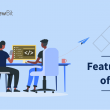- Introduction
- Why Learn SQL?
- What Makes the Best SQL Books?
- Best Books for SQL
- SQL Books For Beginners
- 1. Getting Started with SQL
- 2. Runner-Up, Best for Beginners: SQL All-in-One For Dummies
- 3. SQL in 10 Minutes
- 4. Best for Creating Complex Queries: SQL Queries for Mere Mortals
- Intermediate SQL books
- 5. Best for Quick Reference: SQL Pocket Guide
- 6. T-SQL fundamentals
- 7. Murach’s SQL Server 2019 for Developers
- SQL Books For Experts
- Conclusion
- FAQs
- Q.1: How many days it will take to learn SQL?
- Q.2: Is SQL enough to get a job?
- Q.3: Should I learn Python or SQL first?
- Q.4: What is the salary of a SQL developer?
- Additional Resources
Introduction
SQL(Structured Query Language) has been around for a long time now and yet it is still the most prevalent query language developed for communicating with databases. The benefits of SQL comprise revising database tables and index structures; incorporating, revamping, and deleting rows of data; and recovering subsets of data from within a database for the purpose of transaction processing and analytics applications.
SQL was designed by IBM in the early 1970s. Its capability to run queries including retrieve, incorporate, revise, and delete was astounding and compelling to future technologies like RESTful APIs and CRUD (Create, Read, Update, and Delete). In this article, we will discuss a few of the fantastic SQL books. With these books, you can learn more about SQL quickly and evolve as an indispensable programmer or data analyst.
Why Learn SQL?
Mentioned below are the grounds which might interest you in learning SQL:
Confused about your next job?
- Become a Data Analyst: Data analysts can make use of SQL to look for trends, draw findings, and report insights regarding the data they contain.
- Rising job opportunities: The job market for consultants and data analysts is expanding. As the world strives to accumulate more data we continue to require people to manage it.
- Do what matters: As a developer or someone in any profession, you should learn to gather and store your data effectively and make decisions that matter to your life.
- Become Indispensable: SQL is never out of style, once you have mastered SQL, you can use the principles you have learned for the rest of your career.
What Makes the Best SQL Books?
When searching for the best books to know more about SQL, you might ponder the standards we use to evaluate these books. Many books that are found on the internet are spinning pieces of information that are easily available on the internet.
Mentioned below are certain criteria for choosing books:
- It must have a structured, precise, and rational advancement of topics.
- The book should be simple and easy to comprehend.
- Incorporate exercises, samples, and practice problems to offer hands-on experience.
- Should be fascinating and able to grasp the attention of readers.
- The book should include a precise layout and ought to be friendly toward self-taught developers.
- As bonus points, the book includes a few fun and conversational styles to retain engagement.
Best Books for SQL
The best SQL books can assist you in comprehending the fundamentals of starting your career with SQL, while the intermediate and more advanced books can direct you to fully master SQL and avoid common errors. SQL books aimed at beginners will inform you that at its very core, SQL isn’t a database itself. It is just a query language that deals with and works with the databases it is used for. Useful SQL books for novices will also offer you some instances of databases that work excellently with SQL queries like MySQL, Oracle, MongoDB, etc. Just like any subject, the benefit of SQL queries exhibits a learning curve to it that can be well comprehended to make the most of it. There are different SQL books available in the market that can demonstrate to the readers the most suitable methods to get the work done on SQL. Depending on the user’s knowledge and their experience with SQL, there are a few best SQL books for beginners and advanced.
SQL Books For Beginners
1. Getting Started with SQL
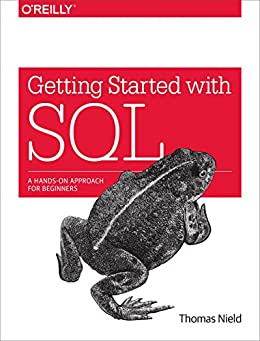
Author: Thomas Nield
Edition: 1st Edition
Getting Started with SQL is the perfect book, to begin with if you have just dipped your toe in the water. At 130 pages, the book is moderately short, determined on assisting readers to grasp the basics and quickly understand how to accomplish useful tasks. Packed with hands-on examples and practical rationales, it’s documented in a clear, accessible style that doesn’t presume much or any prior knowledge. For people who have just started out, the book doesn’t demand access to an existent database server. Rather, it describes how to set up a practice environment at home, with the help of SQLite to minimize expense and complexity.
While the majority of the book concentrates on the basic commands required for data retrieval, sorting, and updating, the last chapter examines more evolved topics and delivers added resources for those who are interested.
You’ll also learn how to:
- Analyze relational databases, like lightweight and centralized models.
- Utilize SQLite and SQLiteStudio to construct lightweight databases in minutes.
- Query and transform data in significant ways by employing SELECT, WHERE, GROUP BY, and ORDER BY.
- Join tables to obtain a more comprehensive idea of your business data.
- Create your tables and centralized databases by making use of normalized design principles.
- Control data by knowing how to INSERT, ERASE, and UPDATE records.
2. Runner-Up, Best for Beginners: SQL All-in-One For Dummies
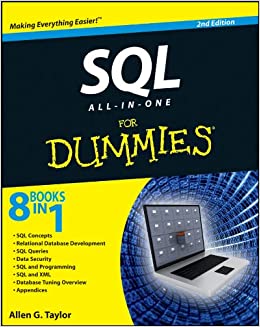
Author: Allen G. Taylor
Edition: 2nd Edition
Chances are you’ve noticed the unique black and yellow design of a “For Dummies” book at some stage or other. The series does cover an excellent spectrum of topics, after all. This is a weighty tome, but its seven hundred fifty-plus pages are divided into eight volumes, with a rational structure that makes functioning through it less overwhelming. The book is penned in a light and convenient manner, it does expect some sort of common technical knowledge from the reader, but not the knowledge of database administration or development necessarily.
SQL All-in-One for Dummies talks about different other related topics, like XML, data security, database performance tuning, and more. The book is can be found in both Kindle as well as paperback, with code downloads available from the publisher.
You will learn about
- Delivers a summary of the SQL language and analyzes how it is necessary for the storage and recovery of database information
- Updates to SQL standards as well as any latest features
- Detailed SQL concepts, development of the relational database, SQL queries, data security, database tuning etc
- Talks about the connection between SQL and programming along with SQL and XML.
3. SQL in 10 Minutes
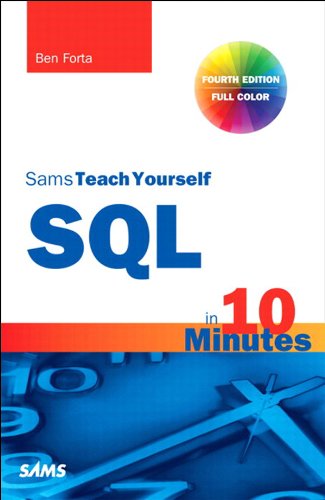
Author: Ben Forta
Edition: 4th Edition
If you’re a programmer, business analyst, or anyone else who ought to quickly learn more about SQL, SQL in 10 Minutes was documented with you in mind. While you’re unlikely to evolve as an expert quite that fast, the book does a great job of teaching the essentials in a hurry and is broken down into 22 lessons that cover everything from basic SELECT and UPDATE statements to more evolved topics like transactional processing and stored procedures. The content is delivered in a rational and systematic order, but it’s also simple to move in and out of each section of the book as required, knowing syntax and concepts only when you need them. Different database platforms are talked about in the book, ranging from SQLite to MySQL, Microsoft Access and Oracle, and more, setting relevant and directly applicable examples to a wider spectrum of readers. The paper version of the book is filled with full-color code examples and sufficient tutorials to help every learner.
You will learn about
- Usages of the major SQL statements
- Create complex SQL statements with the help of numerous clauses and operators
- Recover, categorize, and format database contents
- Identify the data you require with the help of a variety of filtering techniques
- Make use of aggregate functions to summarize data
- Join two or more related tables
- Insert, update, and delete data
- Create and alter database tables
If you’re searching for an updated sequel to the bestselling 1st edition of SQL All-in-One For Dummies, then this is the right pick for you.
4. Best for Creating Complex Queries: SQL Queries for Mere Mortals
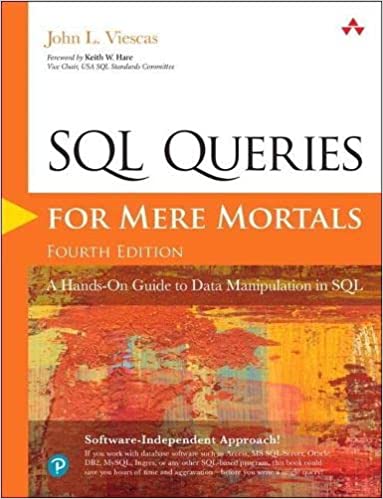
Author: John Viescas
Edition: 4th Edition
As the name implies, SQL Queries for Mere Mortals concentrates on familiarizing its readers on how to become ab expert at constructing even complex queries with ease. With a rational and humorous strategy to what isn’t the most exciting of subjects, the author presents several examples along with his clearly-documented explanations of the concepts of SQL, strategies, and best practices for database design and queries.
Novices will be benefitted from this book, but even those possessing a reasonable degree of knowledge on SQL are likely to comprehend different new tips and tricks. Updated for the 4th edition with the latest topics including sample databases, partitioning and grouping, and creation scripts are available for MySQL, SQL Server, Microsoft Access, and other platforms.
You will learn about
- Comprehending what relational databases are, and guaranteeing that your database structures are proper
- With the help of SELECT statements, constructing expressions, organizing information with ORDER BY, and filtering data with the help of WHERE
- Grouping and summarizing data with GROUP BY and HAVING clauses
- Pulling data from numerous tables: using INNER and OUTER JOIN, and UNION operators, and operating with subqueries
- Revising data sets with UPDATE, INSERT, and DELETE statements
Intermediate SQL books
5. Best for Quick Reference: SQL Pocket Guide
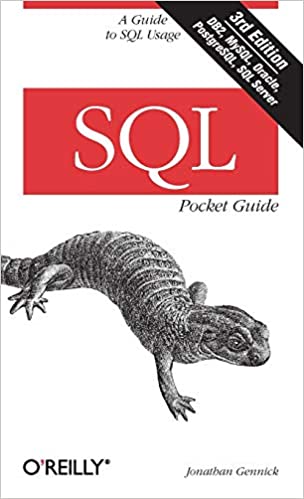
Author: Jonathan Gennick
Edition: 3rd edition
If you’re an entry-level programmer or database administrator, or if you have been working with SQL for years, remembering the attributes of each and every possible command and argument is next to impossible. That’s when Jonathan Gennick’s compact SQL Pocket Guide comes in handy.
Talking about a myriad of database servers like Microsoft SQL Server, Oracle, DB2, etc, this handy reference describes implementation differences between platforms and serves as a perfect refresher for seldom-used commands. Developed as a reference instead of a how-to manual, there’s no requirement to go through the book from cover to cover, one can refer to the book when necessary. While most of the information about SQL is found on the internet, reading through SQL Pocket Guide for the exact details you need is often quicker and more specific.
You’ll also learn
- Oracle’s support of the recursive WITH syntax
- Addition of PIVOT and UNPIVOT operators
- Functions new to Oracle, including LISTAGG, NTH_VALUE etc
- PostgreSQL’s support of recursive WITH and some window functions
- DB2 syntax and datatypes
- MySQL features including the TO_SECONDS function and the TIMESTAMP type
6. T-SQL fundamentals
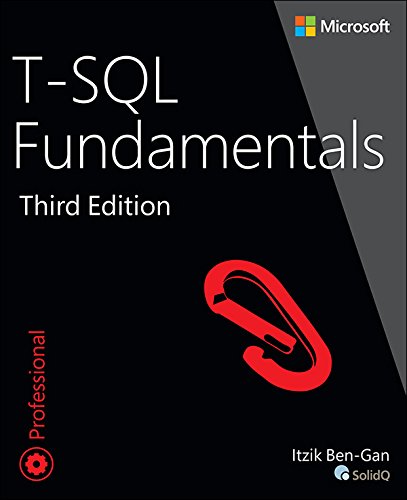
Author: Itzik Ben-Gan
Edition: 3rd edition
We have often seen that most SQL guides and references are platform-agnostic, which lets them be useful to a broader range of readers but these are not completely correct or complete for any particular database system. While the book is directed to those new to the language, T-SQL Fundamentals deals with more refined and optional topics as well. Code samples have been tested against the cloud as well as on-premises installations of SQL Server, enabling you to use them owing to whichever version you have access to. Beneficial for database administrators, programmers, and power users, this book isn’t only about a list of commands and syntax. Rather, it introduces both the theory behind T-SQL and the best usage of it in the real world, containing ample practical examples to help out along the way.
You’ll also learn how to
- Assess core SQL ideas and their mathematical roots.
- Design tables and implement data integrity.
- Run adequate single-table queries by making use of the SELECT statement.
- Query multiple tables by utilizing table expressions, joins, set operators, and subqueries.
- Utilize refined query techniques including window functions, pivoting, and grouping sets.
- Insert, edit, delete, and combine data.
7. Murach’s SQL Server 2019 for Developers
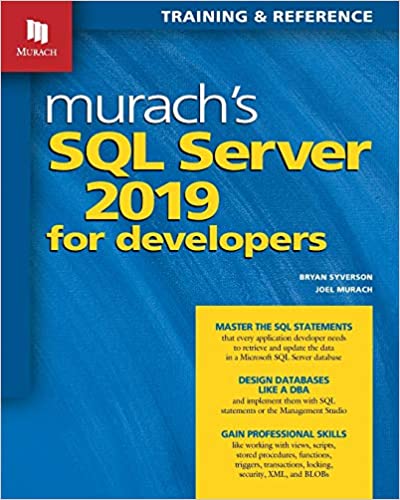
Author: Joel Murach
Whether you’re a skilled programmer needing to improve your Microsoft SQL Server skills or a novice aiming to get better at SQL coding, this book is the perfect pick to start. The nearly 700-page book is mainly directed towards programmers, but one can find relevant, helpful information on database administration also. The twenty chapters in the book are segregated into four sections, introduction, crucial SQL skills, refined SQL skills, and database design and implementation. Everything in the book is defined in a simple yet clear manner, whether it’s introductory topics such as recovering and summarizing data, or more complex subjects including triggers, stored procedures, or making use of the .NET CLR (common language runtime).
You will learn about
- Design a database and learn how to enforce that design
- How to work with database features such as functions, views, scripts, stored procedures, triggers, transactions, XML data, security, BLOB data with FILESTREAM storage, and the CLR integration feature.
SQL Books For Experts
8. SQL Cookbook: Query Solutions and Techniques for Database Developers
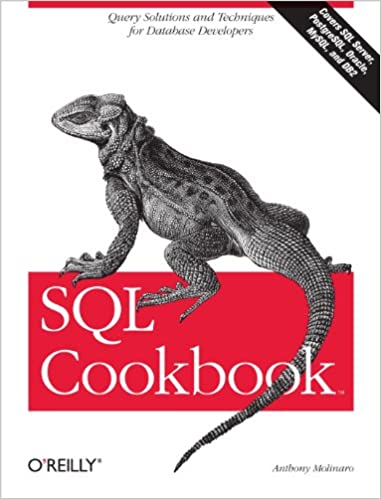
Author: Anthony Molinaro
Edition: 1st Edition
This is another excellent book for skilled developers and anyone who codes SQL for a living. The book says “SQL is a deceptively simple language” and many developers don’t think beyond the simple CRUD statements such as SELECT, INSERT, UPDATE, DELETE etc. Nevertheless, there are many things you can do with SQL and this is where SQL Cookbook comes in handy. It will show you ways to take your SQL skills a notch higher by utilizing author Anthony Molinari’s favorite SQL techniques and features. You will know about advanced SQL concepts such as window functions, database-specific features like PIVOT and UNPIVOT operators of SQL Server, the Oracle’s MODEL clause, and PostgreSQL’s handy GENERATE_SERIES function. This book also describes the method of walking a string, which lets you make use of SQL to parse through the words, characters, or delimited string elements. In a nutshell, this is one of the great books to take your SQL skill a notch higher.
You’ll learn about:
- Window functions
- Pivoting rows into columns
- Reverse-pivoting columns into rows
- Using pivoting to promote inter-row calculations
- Bucketization
9. SQL Performance Explained
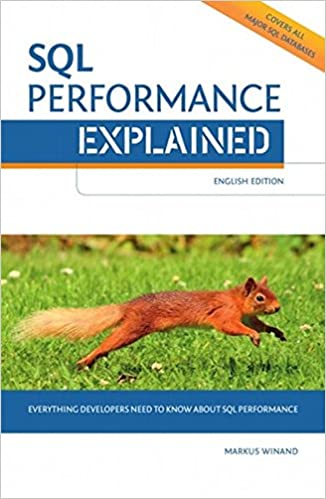
Author: Markus Winand
This is another progressive SQL book that each developer and data Scientist should read. If you seek to learn how Database runs your SQL queries? What exactly is a query engine? How do indexes work while updating records and exploring records? How to pen better SQL queries? then this book is meant for you. This wonderful book is composed by Markus Winand and it is commendable how he has explained such an essential topic in great detail. This is one of the must-read SQL books for every developer and a highly recommended book for every software developer and Data Scientist. Another wonderful aspect of this book is that Markus describes notions and code in all major databases including PostgreSQL, MySQL, Oracle, and SQL Server, which implies you will comprehend better, no matter whichever database you choose to use.
You will learn about
- Correctly application of SQL functions
- Effective use of LIKE queries
- Optimizing join operations
- Clustering data to enhance performance
- A pipelined implementation of ORDER BY and GROUP BY
- Getting the most useful performance for pagination queries
- Comprehending the scalability of databases
10. SQL for Smarties: Advanced SQL Programming
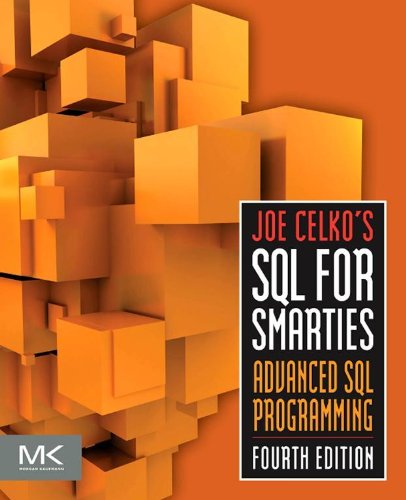
Author: Joe Celko
Edition: 5th Edition
This is an amazing book to take your SQL skill to the next level. Joe Celko is one of the authorities in SQL and also the writer of different popular SQL books, such as SQL Puzzles. This book presents tips, strategies, and guidance on documenting useful, sometimes complicated, SQL statements with the help of ANSI standard SQL. It touches on topics varying from database design and normalization to the usage of appropriate data types to grouping and set operations, data scaling, optimization, etc
You will learn about
- Data element names to meet new ISO-11179 rules having similar experience-based teaching style.
- New methods to pen common queries, such as finding coverings, partitions, runs in data, auctions and inventory, relational divisions and so forth
- Principles of SQL programming
- Design flaws in DDL, including attribute splitting, non-normal forum redundancies and tibbling.
Conclusion
That’s all about some of the finest books to understand basic to advanced SQL programming. If you tend to use SQL in your projects, or if you are learning SQL, or if you are already working with SQL for a couple of years, you can go through these books to take your SQL skills a notch higher. Though considered a tricky language to learn, SQL can be easily grasped with the help of books and projects. It’s important to have a thorough knowledge of SQL for those who want to work with databases of all kinds with ease. This list of SQL books for beginners to advanced should allow one to do well with SQL.
FAQs
Q.1: How many days it will take to learn SQL?
Answer: It would take about 10-15 days to understand the fundamentals of SQL and around 1.5 – 2 months to attain mastery in SQL.
Q.2: Is SQL enough to get a job?
Answer: If you’re searching for your first job in data, it turns out learning SQL is even more essential. For the role of a data analyst, SQL is again the most sought-after skill.
Q.3: Should I learn Python or SQL first?
Answer: The best way to start your career in this field is by learning SQL. SQL is an important tool for any kind of data recovery from relational databases.
Q.4: What is the salary of a SQL developer?
Answer: A fresher programmer can anticipate a salary of about Rs. 289,520 per annum. With some expertise in this field, the salary per annum can go beyond 6L.




